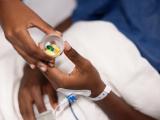A new study suggests that people who've recently been hospitalized could potentially be a major source of methicillin-resistant Staphylococcus aureus (MRSA) transmission in households.
The study, published yesterday in Infection Control & Hospital Epidemiology, found that household members exposed to a family member recently diagnosed with MRSA were more than 71 times more likely to get a MRSA infection than those who had not been exposed to a family member with MRSA. But the study also found that exposure to recently hospitalized patients with no MRSA diagnosis was associated with an increased risk of MRSA infection, likely because those patients had been colonized with MRSA during their hospital stay.
"Patients can become colonized with MRSA during their hospital stay and transmit MRSA to their household members," lead study author Aaron Miller, PhD, an assistant professor of internal medicine-infectious diseases at the University of Iowa, said in a press release from journal publisher the Society for Healthcare Epidemiology of America (SHEA). "This suggests hospitals contribute to the spread of MRSA into the community through discharged patients who are asymptomatic carriers."
Hospitalization increases risk of household transmission by 44%
MRSA has long been a common cause of healthcare-associated infections in US hospitals, particularly in patients who've had surgeries or have indwelling devices. It can cause skin infections and more severe invasive infections. There are also community-associated strains of MRSA that cause skin infections in otherwise healthy people and can easily be transmitted in crowded settings and households through skin-to-skin contact. Some people carry MRSA on their skin without ever becoming infected.
To determine the extent to which recent MRSA diagnosis and hospitalization might increase the risk of MRSA transmission in households, Miller and his colleagues extracted patient data from a large commercial insurance database from 2001 through 2021, limiting the population to households with two or more family members on the same insurance plan.
They then identified cases of MRSA in both inpatient and outpatient settings and compared the monthly incidence of MRSA between individuals in households where another member had been diagnosed with MRSA in an inpatient or outpatient setting within the last 30 days, and individuals in households with no recent MRSA exposure. In a second analysis, they looked at MRSA incidence in households where a family member had recently been hospitalized but not diagnosed with MRSA.
Patients can become colonized with MRSA during their hospital stay and transmit MRSA to their household members.
Among the more than 157 million enrollees included in the study, the researchers identified 424,512 MRSA cases in 343,524 individuals. Of the MRSA cases identified, 4,724 (1.1%) represented a possible transmission linked to a recent MRSA diagnosis in a separate family member, and 8,064 (1.9%) represented possible transmission after recent hospitalization of a separate family member.
A stratified regression analysis found that the estimated incidence rate of MRSA among those exposed to a family member with a MRSA diagnosis was more than 71 times the rate compared with those not exposed to a family member with MRSA (incidence rate ratio [IRR], 71.03; 95% confidence interval [CI], 67.73 to 74.50). Among those individuals who had a family member who was recently hospitalized but not diagnosed with MRSA, the IRR of MRSA was 1.44 (95% CI, 1.39 to 1.49).
"This relatively smaller estimate is consistent with our understanding that only a portion of hospitalized patients are colonized with MRSA at discharge," Miller and his co-authors wrote. But they add that with 25 million Americans having overnight hospital stays annually, patients who come home colonized with MRSA could represent a "potentially major source" of MRSA infections in household members.
Findings highlight importance of hospital infection practices
The analysis also found that the risk of MRSA among household members increased the longer the recently hospitalized family member was in the hospital. The IRR increased from 1.34 (95% CI, 1.28 to 1.40) when a family member was hospitalized for 1 to 3 days to 1.49 (95% CI, 1.41 to 1.57) when hospitalization lasted 4 to 10 days.
Other factors associated with MRSA infection in household members included the number of comorbidities, prior antibiotic usage, and having young children in the family.
The authors note that the findings are limited by the inability to determine exact exposure status among family members and the lack of sequencing data to study potential transmission events. Miller added that it's important not to over-emphasize the risk, since the overall number of MRSA cases identified was low.
But SHEA president Thomas Talbot, MD, who was not involved in the research, said the link found between hospitalization and household MRSA transmission highlights why hospital infection prevention and control practices are so important.
"Hand hygiene, environmental cleaning, and standard interventions to reduce Staphylococcal colonization are crucial to preventing the spread of resistant bacteria in healthcare settings," he said.























